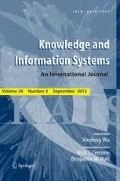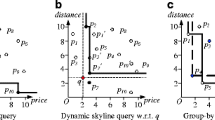Abstract
The G-Skyline (GSky) query is formulated to report optimal groups that are not dominated by any other group of the same size. Particularly, a given group \(G_1\) dominates another group \(G_2\) if for any point \(p\in G_1\), p dominates or equals to points \(p{'}\in G_2\); at the same time, there is at least one point p dominating \(p{'}\). Most existing group skyline queries need to calculate an aggregate point for each group. Compared to these queries, the GSky query is more practical because it avoids specifying an aggregate function which leads to miss important results containing non-skyline points. This means the GSky query can get much more comprehensive query results which not only contain the G-Skylines consisting of skyline points but also the G-Skylines including non-skyline points. Here, a non-skyline point is dominated by another point in a given data set. However, the GSky query usually returns too many results, making it a big burden for users to pick out their expected results. To address these issues, we investigate a flexible group skyline query, namely Flexible G-Skyline (FGSky) query, which is flexible and practical for directly computing the optimal groups on the basis of user preferences. In this paper, we formulate the FGSky query, identify its properties, and present effective pruning strategies. Besides, we propose progressive algorithms for the FGSky query where a grouping strategy and a layered strategy are utilized to get better query performance. Through extensive experiments on both synthetic and real data sets, we demonstrate the efficiency, effectiveness, and progressiveness of the proposed algorithms.











Similar content being viewed by others
References
Borzsony S, Kossmann D, Stocker K (2001) The skyline operator. In: Proceedings of the international conference on data engineering, pp 421–430
Chung Y-C, Su I-F, Lee C (2013) Efficient computation of combinatorial skyline queries. Inf Syst 38(3):369–387
Im H, Park S (2012) Group skyline computation. Inf Sci 188:151–169
Magnani M, Assent I (2013) From stars to galaxies: skyline queries on aggregate data. In: Proceedings of the international conference on extending database technology. ACM, pp 477–488
Zhang N, Li C, Hassan N, Rajasekaran S, Das G (2014) On skyline groups. IEEE Trans Knowl Data Eng 26(4):942–956
Liu J, Xiong L, Pei J, Luo J, Zhang H (2015) Finding pareto optimal groups: group-based skyline. In: Proceedings of the international conference on very large data bases, vol 8, no 13
Xu Z, Li K, Yang Z, Xiao G, Li K (2018) Progressive approaches for pareto optimal groups computation. IEEE Trans Knowl Data Eng 99:1
Wang C, Wang C, Guo G, Ye X, Yu PS (2018) Efficient computation of g-skyline groups. IEEE Trans Knowl Data Eng 30(4):674–688
He Z, Lo E (2012) Answering why-not questions on top \(k\) queries. In: Proceedings of the IEEE international conference on data engineering (ICDE), pp 750–761
Islam MS, Zhou R, Liu C (2013) On answering why-not questions in reverse skyline queries. In: Proceedings of the IEEE international conference on data engineering (ICDE), pp 973–984
Gao Y, Liu Q, Chen G, Zheng B, Zhou L (2015) Answering why-not questions on reverse top \(k\) queries. In: Proceedings of the international conference on very large data bases (VLDB), vol 8(7), pp 738–749
Chen L, Lin X, Hu H, Jensen CS, Xu J (2015) Answering why-not questions on spatial keyword top \(k\) queries. In: Proceedings of the IEEE international conference on data engineering (ICDE), pp 279–290
Liu Q, Gao Y, Zheng B, Zhou L (2016) Answering why-not and why questions on reverse top \(k\) queries. VLDB J 25(6):867–892
Islam MS, Liu C, Li J (2016) Efficient answering of why-not questions in similar graph matching. In: Proceedings of the IEEE international conference on data engineering (ICDE), pp 2672–2686
Chen L, Xu J, Jensen CS, Li Y (2016) Yask: a why-not question answering engine for spatial keyword query services. In: Proceedings of the international conference on very large data bases (VLDB), vol 9(13), pp 1501–1504
Tran QT, Chan CY (2010) How to conquer why-not questions. In: Proceedings of the ACM SIGMOD international conference on management of data (SIGMOD)
Wan Q, Wong RC-W, Ilyas IF, Özsu MT, Peng Y (2009) Creating competitive products. Proc VLDB Endow 2(1):898–909
Su I-F, Chung Y-C, Lee C (2010) Top-k combinatorial skyline queries. In: Database systems for advanced applications. Springer, pp 79–93
Zhou X, Li K, Yang Z, Xiao G, Li K (2018) Progressive approaches for pareto optimal groups computation. IEEE Trans Knowl Data Eng 31(3):521–534
Zhu H, Zhu P, Li X, Liu Q, Xun P (2017) Parallelization of group-based skyline computation for multi-core processors. Concurr Comput Pract Exp 29(3):e4195
Zhu H, Zhu P, Li X, Liu Q (2017) Top \(k\) skyline groups queries. In: Proceedings of the ninth international conference on extending database technology (EDBT)
Zhu H, Li X, Liu Q, Xu Z (2019) Top-k dominating queries on skyline groups. IEEE Trans Knowl Data Eng 32:1431–1444
Yu W, Liu J, Pei J, Xiong L, Chen X, Qin Z (2019) Efficient contour computation of group-based skyline. IEEE Trans Knowl Data Eng 32:1317–1332
Miao X, Gao Y, Guo S, Chen G (2018) On efficiently answering why-not range-based skyline queries in road networks. IEEE Trans Knowl Data Eng 30(99):1
He Z, Lo E (2014) Answering why-not questions on top \(k\) queries. IEEE Trans Knowl Data Eng 26(6):1300–1315
Chen L, Gao Y, Wang K, Jensen CS, Chen G (2016) Answering why-not questions on metric probabilistic range queries. In: Proceedings of the IEEE international conference on data engineering (ICDE), pp 767–778
Chen L, Li Y, Xu J, Jensen CS (2017) Direction-aware why-not spatial keyword top-k queries. In: Proceedings of the IEEE international conference on data engineering (ICDE), pp 107–110
Chen L, Li Y, Xu J, Jensen CS (2018) Towards why-not spatial keyword top \(k\) queries: a direction-aware approach. IEEE Trans Knowl Data Eng 30(99):796–809
Ding X, Jin H (2012) Efficient and progressive algorithms for distributed skyline queries over uncertain data. IEEE Trans Knowl Data Eng 24(8):1448–1462
Zhou X, Li K, Zhou Y, Li K (2016) Adaptive processing for distributed skyline queries over uncertain data. IEEE Trans Knowl Data Eng 28:371–384
Ren W, Lian X, Ghazinour K (2019) Skyline queries over incomplete data streams. VLDB J 28:961–985
Papadias D, Tao Y, Fu G, Seeger B (2005) Progressive skyline computation in database systems. ACM Trans Database Syst 30(1):41–82
Acknowledgements
The authors would like to thank the anonymous reviewers for their valuable and helpful comments on improving the manuscript. The research was supported by the NSFC (Grant Nos. 61802032, 61772182, 61602170), the Key Program of NSFC (Grant No. 61432005), the International (Regional) Cooperation and Exchange Program of NSFC (Grant No. 61661146006), the Emergency Special Project of NSFC (Grant No. 61751204), the Key Area Research Program of Hunan (2019GK2091), and the Hunan Province Key Laboratory of Industrial Internet Technology and Security (2019TP1011). Xu Zhou is the corresponding author of this paper.
Author information
Authors and Affiliations
Corresponding author
Additional information
Publisher's Note
Springer Nature remains neutral with regard to jurisdictional claims in published maps and institutional affiliations.
Rights and permissions
About this article
Cite this article
Yang, Z., Zhou, X., Li, K. et al. Progressive approaches to flexible group skyline queries. Knowl Inf Syst 63, 1471–1496 (2021). https://doi.org/10.1007/s10115-021-01562-8
Received:
Revised:
Accepted:
Published:
Issue Date:
DOI: https://doi.org/10.1007/s10115-021-01562-8




